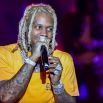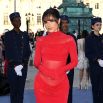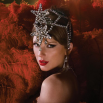Australian electronic music trio RÜFÜS DU SOL are poised to break out. Their debut album Atlas went to number one in their home country and three years later the trio of Tyrone Lindqvist, Jon George, and James Hunt are ready to release their second album Bloom.
The trio have received their fame for an eclectic mix of cheerful, sun soaked tracks electro-pop tracks and hazy, moody, progressive tunes, which tend to be at the end of their albums. Their new record fits that mold as well, ending with Lindqvist's favorite track, the nine-and-a-half minute epic "Innerbloom."
We had the chance to catch up with Lindqvist from his place in hot Sydney and chat about the album and how it was written and produced in Berlin, getting back to having fun making music, Coachella, jellyfish and Jon's fear of the number seven.
MT: Each of your play your own designated instruments live. Is that how things also work in the studio?
RÜFÜS DU SOL: Not really. We all have our little stations when we play live. I sing, Jon plays a lot of the synths, James plays a little of the drums and then they both have their SPDS pabs and I've got a synth. Sometimes I'll play the guitar and it's cool because live we can kind of choose each part that we want to play so we can kind of share the songs. If Jon plays a lead line in one of the songs then in another one if I'm not singing as much I can play a lead line instead of chords. In the studio it's a bit freer reign. It's just three guys having fun producing and writing together. Sometimes I'll be on the keys, sometimes Jon or James will -- we all have our strengths and different arts of what we do and bring our own little flavor to the unit.
MT: Is your studio at home or do go to a specific studio to work?
R: We've always had a DIY set up for studios I guess we started off producing from our bedrooms lie most kids these days then we set up a studio in an emptied out water tank for our first album which was awesome. It was just a space to write really. It wasn't a great sonic space but it was really good just to lose some time and have a space to write music. For this one we rented an Airbnb in Berlin for two months, set up a little studio there which was basically just a space to write a lot of ideas and then came back to Australia and leased a studio in studio 301. It's a small little vocal booth and a mixing room where we set up our analog synths and in the vocal booth with set up our amps for any guitars. It was a perfect space to mix and record.
MT: Why did you guys go to Berlin?
R: We knew we wanted to go to somewhere else other than Australia to write the second record just for inspiration and to mix things up to throw ourselves somewhere new. We wanted to write a new album that wasn't necessarily the same as the first one and I think we were really influenced by the environment we live in. The first album was written on the beach and I feel it sonically really inspired it. This one we had been to Berlin and we fell in love with the city and we all agreed it was a perfect place to go to start the process of writing a record and we got everything we could have dreamed out of out of our two months living there.
MT: What part of the album that was most influenced by Berlin?
R: "Innerbloom" the last track on the album is basically our thank you or our nod to our time in Berlin. It's quite a long song at 9 ½ minutes. It's a little more indulgent and it has a slower progression.
MT: I read that the title was inspired by a group of jellyfish. Why what makes jellyfish special?
R: When you are starting a project you don't know what the title's going to be or what it's going to be about so we just kind of named it something for the time being. We went through and had animal names and we went through the alphabet so a, we would have ant, B, buffalo and C chameleon. We would go through the alphabet and we went through the alphabet three times.
We did land animals first and sea creatures second. Jellyfish was a title and there's something really cool about jellyfish. It's this single cell organism that is so beautiful in the water -- it's pretty mesmerizing. We put up a picture of any sea creature but jellyfish just seemed to be the one that we kept putting on the screen. When you have to look at the computer screen a good bit of the day when we are writing or recording, so we might as well put something that feels nice and jellyfish happened to be that.
MT: How would you compare this album sonically to Atlas?
R: There's more warmth to this one. We used a lot more analog synths on this record. We grew appreciation for a lot of the music we heard in Berlin. It was very analog driven and it just has this warmth. I would have never understood what that was during our first album or our first EPs. I found it hard to hear the difference and it still is quite difficult but for some reason there's some underlying thing that's just this level of unpredictability of warmth and wide scoped sound that analog synth brings out.
A lot of the percussion on this album is the nicest percussion that we've written and it is very inspired minimal techno. I think the lyrics on this record are a bit more personal and we weren't setting out to write a personal album it just ended up that way. On the first album it was a lot more escapism type of lyrics. We were singing about going places or where we enjoy to be but mainly escaping. But this one is more of a reflection of where we are right now or where we were when we were writing the record.
MT: Was it a conscious effort on both of your albums to go from happy, summery songs to more melancholic progressive tracks?
R: I think it's just the type of album we enjoy to listen to is, I love turning on a record and the first few songs make me excited something that makes me go AHA. If I've been waiting a long time for an album to come out from any artist I look up to, I get really excited about that feeling from the first 3 or 4 tracks. I love the depth of the tail end of a record. I think an artist will have a bit more freedom to do whatever they want in the second half of an album. For us being inspired by acts like Booka Shade, Trentemoller and David August, they all have a tendency to they have a darker edge to whatever they are doing, so I think it's kind of like a happy fluke that it ended up in a similar types of journeys going from light then getting darker towards the end on both albums.
MT: What's your favorite song on the album?
R: I can't really pick a favorite it's kind of like choosing your favorite child. I really love "Innerbloom" -- I love the whole album, but that one I probably like because of the time we wrote it. We had written most of the album and were really happy and comfortable with what was there but you can spend so long fixing and tweaking things you almost lose the fun of what you're doing.
We went into the studio one day and it was basically us just reminding each other why we do what we do and we basically said "let's just have fun today" and came up with that chord pattern. We said look let's not write a song for the record today and just have fun. To be honest it was one of the fastest songs to come out. We didn't think, we just kept writing. We were certain it wouldn't end up on the album because it followed no rules and it seemed too far removed from what people might like from us. We didn't really think about it we just did whatever we wanted and it ended up being a 9 ½ minute song that we all fell in love with.
MT: Who is the female vocalist on "Hypnotized"?
R: To be honest when we set out writing the record since we had a female vocalist on the first album we thought everyone would maybe expect another feature vocalist. We didn't really want to do it because I like being surprised personally and to not know the formula of what an artist is going to do. We talked about it and we were definitely not aiming to do it. We were open to doing a duet with a male vocalist actually and we tried to find the right song for that and it did not really eventuate in the end.
When we were writing the vocal line for "Hypnotized," it just painted itself so nicely to being a duet that it was it was hard not to at least try. So we got Jon's girlfriend Dina Caplan into laying some vocal demos in the studio and we fell in love with it straight away. We tried other vocalist too and we just couldn't really get past the vocal that she put down. There was this effortless ease where it wasn't like she wasn't singing as much as she was talking to you.
MT: How would you rate your Coachella booking among your career achievements?
R: It's definitely up there. It's one of those festivals from Australia you've either been to it or you've heard about it. It's just one of those giant life goals. It's not like it's my childhood dream but it's something that I've always wanted to go and see for myself. Now that we've played in a band the past six years I don't think I ever saw myself playing there because it's so big. The opportunity is epic, we are so stoked to be getting over there and it seems at the right time for us as well. We've been over there a couple times and the shows have gone well and it feels like the right time.
MT: What's your take on the lockout laws?
R: It sucks a lot for the night life in Sydney and even live music. The noise restrictions to me are probably a little bit more frustrating than the lockout laws alone. Basically every show we did with or without Odesza in the US no venue ever kicked up a stink about playing a show where the volume was a good amount of volume. You could give fans a show that sounded great that was loud but in Australia some venues don't even have that option because there are residents that will complain. Festivals in Australia don't have volume for shows so it's quiet unless you are standing close to the stage. It's not like that for every show or festival but it has been a big talking point over here. It's probably spreads a lot of parties outwards from the city and it's become more house or warehouse party-orientated which is kind of cool in itself
MT: What is something people might not know about you guys?
R: Fun fact Jon has a thing with the number seven. For some reason it's one of those urban myths he just doesn't like the number seven. We tried to rattle it out of him but he won't give it up.
MT: So what if you're given the hotel room 7?
R: Well he's had 27 or 7 and he doesn't speak about it but everyone knows he just doesn't like it. When he turned 27 two or three years ago that was a big talking point for us too but he gets by he's lived with it his whole life.
MT: What if someone brought a big sign that says 7 on it to a show?
R: I'm sure he'd be alright but if you were to hand it to him and say this is your lucky number I don't know what he would do. There will be 50 session files and they're numbered so we skip every 7 like that's no joke none of the are called 7 it'll be 1, 2, 3, 4, 5 , 6, 8, 9, 10, 11, 12, 13, 14, 15, 16, 18, 19, 20 all the way through and it's so weird because we don't even talk about it anymore. It's just one of those things he doesn't like it he has nothing against it just doesn't like the shape of it the sound of it the look of it.
MT: But "Hypnotized" is track number 7 on the album.
R: And that's one of his favorite songs, so I'm sure he's looked past it. I'm pretty sure on the album itself we don't have numbers on the back. We didn't have it on the first one, but I can't remember if we do on this one.
© 2025 MusicTimes.com All rights reserved. Do not reproduce without permission.




